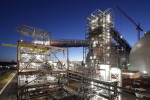Boosting cooling tower price-performance ratio
Published: 14 October, 2014
When evaluating the purchase of most types of capital equipment, the obvious factor to consider is price/performance. Yet, an important factor that most people would agree should not be overlooked is added value, an amenity or service - such as warranty or engineering assistance - that substantially increases the worth of the product, or potential ROI. PWE reports.
When it comes to purchasing a cooling tower, an integral component of many HVAC and heat exchanger systems, value added often takes on more significance than usual. This is because factors such as warranty or engineering and installation assistance can be crucial to performance and extend the service life of the equipment. Hence, value added may significantly enhance the price/performance ratio.
This potential is realised by the latest in cooling tower technology, which features a shell composed of HDPE (high-density polyethylene) “engineered plastic,” and offers both exceptional performance and superior value-added.
Performance
One of the major problems that plague conventional cooling towers performance is corrosion that is imposed by the environment (e.g., salt air, industrial pollutants) or cooling system waters and their required chemical water treatment. With a shell of galvanised sheet metal, the conventional models are maintenance intensive and destined to a relatively brief service life, often seven years or less. The maintenance factor is not only expensive in terms of downtime, but also laborious to clean or coat away corroded shell panels and weld or gasket patches. Plus, the amount of chemicals required to inhibit corrosion is also costly.
Conversely, HDPE engineered plastic cooling towers are impermeable to corrosion. Therefore, they require far less maintenance and downtime, and normally require relatively inexpensive chemicals used to retard biological growth.
When Joe Matthews, VP of Construction at Vista Air Services (Houston, TX) was considering a self-contained, water-cooled HVAC system for a customer near Galveston Bay, he primarily had system efficiencies on his mind. However, since a cooling tower would be essential to the system, he was also concerned about the salt air and corrosive emissions from several surrounding chemical plants that would corrode a conventional, metal-clad cooling tower shell, making frequent maintenance and replacement necessary over the years.
Vista Air Services is a contractor that is involved in all aspects of HVAC systems. The application is a 66,000ft2 industrial turbine repair station and training facility of Mitsubishi Power Systems, for its power generation turbines.
Matthews explained: “B.R. Gonzales, a sales rep from AC Engineered Systems, one of our suppliers, suggested that we go with a Delta cooling tower because AC has had great success with those in Florida.
“Considering the potential for salt-air corrosion, we felt that what was appropriate for Florida would also be suitable for a plant in the proximity of Galveston Bay.”
Matthews also believed that the HDPE cooling tower would be cheaper to maintain. He was quite impressed when he learned that the capital investment required would also result in a savings.
“Considering the potential operating savings, I was surprised to learn that the initial purchase price was also substantially lower than many conventional models”, he added.
The water-cooled system that Vista sold to Mitsubishi was a space-saving design that would economise on plant space compared with an air-cooled system, which would entail massive package units.
“We installed four 40-ton air handlers mounted to the exterior walls, plus four 20-ton air handlers inside,” Matthews explains. “With a typical 40-ton air-cooled package you’ll have a 450ft2 footprint. With our water-cooled system, we are only taking up less than 30ft2.”
For further information please visit: www.deltacooling.com





 QUIREPACE reports it has designed and installed six central vacuum cleaning/bulk removal systems for one of the largest biomass projects in a UK power station conversion. The company says the systems were designed to cover the whole of the project's mechanical handling, storage and out-loading system, including rail reception, screen house, conveyor gantries, dome loading/out-loading, transfer towers and onward to processing silos.
QUIREPACE reports it has designed and installed six central vacuum cleaning/bulk removal systems for one of the largest biomass projects in a UK power station conversion. The company says the systems were designed to cover the whole of the project's mechanical handling, storage and out-loading system, including rail reception, screen house, conveyor gantries, dome loading/out-loading, transfer towers and onward to processing silos.
